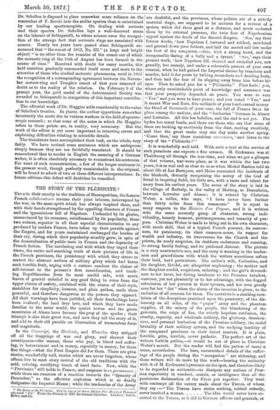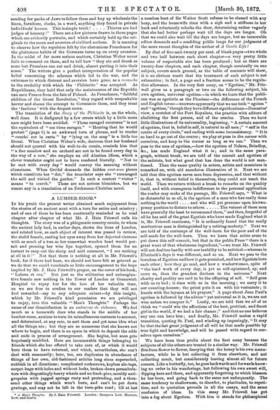THE STORY OF THE PLEBISCITE.*
TRUE to their enmity to the tradition of Buonapartism, the famous French collaborate urs resume their joint labours, interrupted by the war, in the same spirit which has always inspired them, and with their hands strengthened by the appalling disasters of France and the ignominious fall of Napoleon. Undazzled by its glories, unconvinced by its successes, uninfluenced by its popularity, these two writers, superior in all their especial characteristics to any produced by modern France, have taken up their parable against the Empire, and for years maintained unchanged the burden of their cry, during which their popularity steadily grew, in spite of the demoralisation of public taste in France and the depravity of French fiction. The unrelaxing zeal with which they urged their views, the entire and searching truth of their pictures of life in the French provinces, the persistency with which they strove to correct the abstract notions of military glory which had borne such terrible fruit, urging with a curious candour the claims of self-interest to the peasant's first consideration, and teach- ing Republicanism from its most sordid side, with much leaven of general unbelief in any good thing to come from the upper classes of soeiety, combined with the charm of their style, matchless for simplicity, humour, and plain pathos, made them powerful, and therefore dangerous to the powers they opposed. All their warnings have been justified, all their forebodings have been realized ; the land they love, and which they have made familiar to the outer world, the quaint towns and the green mountains of Alsace have become the prey of the spoiler ; their triumph is also their great woe, and now they tell the story of it, and add to their old parable an illustration of tremendous force and magnitude.
In the Conscript, the Blockade, and Waterloo they stripped off all the trappings of war and glory, and showed their countrymen—the masses, those who pay, in blood and suffer- ing, in bereavement and in money, especially in money, for these fine things—what the First Empire did for them. Those are grim stories, wonderfully told, stories which are never forgotten, whose effects live to meet every revival of the old traditions with the cold, calming, rectifying touch of hard facts. Now, while the "Provisoire" still holds in France, and suspense is en permanence ; while there are rumours of a reaction towards the "dynasty of December," as the effective euphuism which is so deadly designates the Imperial House ; while the tendencies of the Army
* The Story of the Plibiaeite. Told by One of the Seven Million Five Hundred Thousand who voted "Yes." From the French ot MM. Erckmann-Chatrian. London : Smith, Elder, and Co.
are doubtful, and the provinces, whose politics are of a strictly material tinge, are supposed to be anxious for a revival of a system which did them good at a distance, and never molested
them by its external presence, the twin foes of Napoleonisat appeal against the deeds of the Second Empire. 'See,' say their former works, how Napoleon L tortured and robbed, murdered and ground down your fathers, and laid the sacred soil low under the foot of the conqueror,—this, with a strong hand, and the
irresponsible daring of a bully and a tyrant.' See,' says their present work, 'how Napoleon III. cheated and swindled you, not grandly, but meanly, and under a colourable pretext of your own consent, when he had gained the Imperial throne by treachery and murder, held it for years by bribing scoundrels and dazzling fools, and then had the fear of its slipping away from him before his eyes. Then he asked you for a " Plebiscite." Poor fools ! you, whose only unmistakable point of knowledge and assurance was that your prosperity depended on peace. You were to vote "Yes," and you were to have peace ; and you voted "Yes," and it meant War and Ruin, five milliards of your hard-earned money the blood of thousands of your sons, the fall of France frcra he place among the nations, and the " barbarian " German in Alsace and Lorraine. All this has befallen, and the end is not yet. The hydra has many heads, and there are those who say that some of them are looking up cautiously from the dust, moving stealthily, and that the great snake may one day make another spring- ' Come then,' say these matchless raconteurs, and listen to the story of the " Plebiscite !" '
It is wonderfully well told. With such a text at the service of such preachers one expects a fine sermon. M. Erckmann was at Phalebourg all through the war-time, and when we get a glimpse of that veteran, war-worn place, as it was within the last two. years, it is as real and as clear to us as when Michel Bastien told us about life at Les Baraques, and Moise recounted the incidents of the blockade, devoutly recognising the mercy of the God of Israel in inspiring Safel, his little son, with a taste and talent for usury from his earliest years. The scene of the story is laid in the village of Rothalp, in the valley of Metting, at Dosenheim„ between Lorraine and Alsace ; it is related by Christian Weber, a miller, who says, "I have never been further than thirty miles from this, commune." It is equal in. many respects to the Ristoire d'un Paysan, and it is written with the same masterly grasp of character, strong indi- viduality, homely humour, picturesqueness, and tenacity of pur- pose. Christian Weber is made to bring out in his own character, with much skill, that of a typical French peasant, its narrow- ness, its parsimony, its clear common-sense, its respect for- wealth and industry, its irreverence for the Church and the its ready suspicion, its stubborn endurance and cunning, its strong family feeling, and its profound distrust. The picture is a very unattractive one, and the story is wanting in the tender- ness and gracefulness with which the writers sometimes soften. their bold, hard portraiture. The miller's wife, Catherine, and his daughter, Gredel, are altogether unpleasing ; the mother and the daughter sordid, suspicious, unloving ; and the girl's devoted- ness to her lover, her daring insolence to the Prussian invaders, contrast, yet not pleasantly or to her advantage, with the dogged submission of her parents to their tyrants, and her own greedy care for her "dot" when the alarm of the invasion is given, to the exclusion of all concern for them. The narrative is a scathing reve- lation of the deceptions practised upon the peasantry, of the dis- honesty on all sides, of the "paper" army and the phantom supplies, of the misery of the people, the blundering of the generals, the reign of lies, the utterly hopeless confusion, the cruelty, rapacity, and wholesale robbery, the gluttony, drunken- ness, and personal barbarism of the Prussian soldiery, the stolid, brutality of their military system, and the undying hostility of the conquered provinces to their hated masters. It is plain, forcible, grim, terrible, never pathetic. The perfect art of the writers forbids pathos,—it would be out of place in Christian. Weber's mouth. But the reader will feel the pathos of many a scene, nevertheless. The bare, unvarnished details of the suffer- ings of the people during the " occupation " are sickening, and these writers will do more by this work—bearing the authority with it of M. Erckmann's presence on the spot, and therefore likely to be regarded as authentic—to dissipate any notions of Prus- sian superiority in conduct, morals, or intelligence than all the passionate declamation of the Press put together. They treat with contempt all the outcry made about the Turcos, of whom they say :—" The Turcos have stolen nothing, robbed nobody, never insulted a woman The idea would never have oc- curred to the Turcos, as it did to German officers and generals, or
sending for packs of Jews to follow them and buy up wholesale the linen, furniture, clocks, in a word, anything they found in private individuals' houses. This is simple truth' Thieves are bad judges of honesty !" There are a few pictures drawn in these pages which are evidently portraits, and which certainly hold up the ori- ginals to the scorn and aversion of civilized nations. It is amusing to observe how the repulsion felt by the abstemious Frenchmen for the gluttonous habits of the Germans turns up on every occasion. In the midst of far more serious matters, Christian Weber never fails to comment on them, and to tell how "they ate and drank as none but Prussians can eat and drink, almost putting it into their noses." The writers give a perfect interpretation of the popular belief concerning the schemes which led to the war, and the extremes to which distrust and aversion have gone, as a revanche to the credulity with which the 'Plebiscite' was accepted. As Republicans, they hold that only the maintenance of the Republic can save France from the fate of Poland. As Frenchmen, "faithful children of the Great Revolution," they regard with unspeakable horror and shame the attempt to Germanize them, and they treat the 'factions' with the deepest scorn.
The translation of the Story of the Ple'biscite is, on the whole, well done. It is disfigured by a few errors which by a little more care might have been avoided. "Those enraged creatures" is not the equivalent of " ces Urea enrages." "Hearing that he would protest" (page 6) is an awkward turn of phrase, and to render 44 couche stir la carte" by "lying on the map" is a little too literal. When Christian \Veber's wife, desirous that her husband should not quarrel with his well-to-do cousin, reminds him that "a fine meadow and an orchard are not to be found every day in the way of a cow," she employs an old Alsatian idiom, which a clever translator ought not to have rendered literally. "Not to be met with every day" would convey the meaning without clumsiness. When Gredel demands the hidden cent-sous pieces which constitute her "dot," the translator says she "rummaged the mill and visited the garden." In such a context " visiter " means "to search." These are not serious blemishes, but we resent any in a translation of an Erckmann-Chatrian novel.



































 Previous page
Previous page